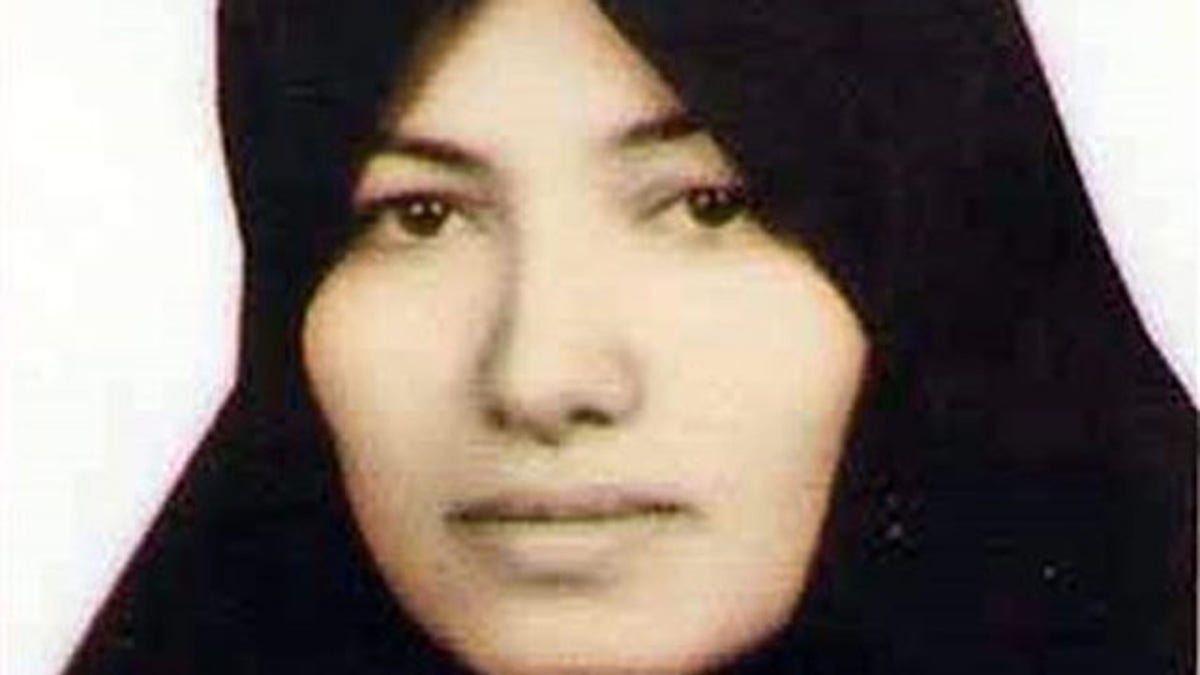
This undated image made available by Amnesty International in London shows Sakineh Mohammadi Ashtiani, a mother of two who had faced stoning to death in Iran on charges of adultery. (AP/Amnesty International)
An Iranian woman convicted of adultery will not be stoned to death but may still face execution in the Islamic Republic, Iran's embassy in London announced Thursday.
Sakineh Mohammadi Ashtiani, 42, a mother of two, was found guilty of adultery in 2006. She has already spent five years in prison and endured 99 lashes for her illicit relationship with two men, but she still is condemned to be put to death.
On Thursday, Iran's embassy in the U.K. issued a press release saying Ashtiani will not be stoned, but it gave no indication that her life will be spared.
"According to information from the relevant judicial authorities in Iran, she will not be executed by stoning punishment," the embassy said in a statement released Thursday. "It is notable that this kind of punishment has rarely been implemented in Iran and various means and remedies must be probed and exhausted to finally come up with such a punishment....
"It should be added that the stoning punishment has not been cited in the draft Islamic Penal Code being deliberated in the Iranian Parliament."
But Ashtiani's 22-year-old son, Sajad Ghadarzade, remains unconvinced that his mother will be spared from stoning, Mina Ahadi, an unofficial spokeswoman for the family, told Fox News on Thursday.
Until the judge in Tehran who ordered the sentence says Ashtiani won't be stoned, it still could happen, according to Ahadi, who works for the International Committee against Stoning and Execution, based in Germany.
Ghadarzade had petitioned Iran's Supreme Leader, Ayatollah Ali Khamenei, President Mahmoud Ahmadinejad and its judiciary chief, Ayatollah Sadeq Larijani, to protest his mother's impending execution.
"I, as an Iranian citizen who has not succeeded in getting an audience with your office, say to you, the head of the judiciary who tells the television networks day in, day out, that justice must prevail and officials guilty of misconduct must be punished, that there is no justice in this country," Ghadarzade wrote to Larijani.
Ghadarzade, who lives in the northern city of Tabriz, wrote that he has traveled at least six times to Tehran to visit the three leaders and has written to them more than a hundred times -- but he has not received a response.
According to a statement released last week by Amnesty International, which tracks death penalty cases worldwide, Ashtiani has retracted a confession she made during interrogation, indicating that the statement was made under duress.
She was convicted by three of five trial judges on the basis of the "knowledge of the judge," a provision in Iranian law that allows judges to rule even in the absence of clear or conclusive evidence. Her death sentence was confirmed by Iran's Supreme Court in May 2007, according to the statement.
Under Iranian law, women convicted of adultery may be buried up to their chests before people throw stones at them until they die. (Men are buried up to their waist prior to stoning.)
At least 139 executions have taken place in Iran this year through Wednesday, said said Ann Harris, a London-based Iran researcher for Amnesty International. She said 10 people -- including three women -- are currently facing execution by stoning.
Iran had faced widespread criticism over the stoning sentence. Among those who issued statements condemning the sentence were the U.S. State Department, Senate Foreign Relations Committee Chairman John Kerry and European Union foreign affairs chief Catherine Ashton.
A spokesman for the State Department said Thursday that the agency has "grave concerns" that Ashtiani's punishment does not fit her crime and cited "significant" human rights concerns.
Kerry, D-Mass., blasted the execution method as "appalling" and "barbaric" and called for the government of Iran to abolish it as a form of capital punishment.
FoxNews.com's Joshua Rhett Miller and Newscore contributed to this report
